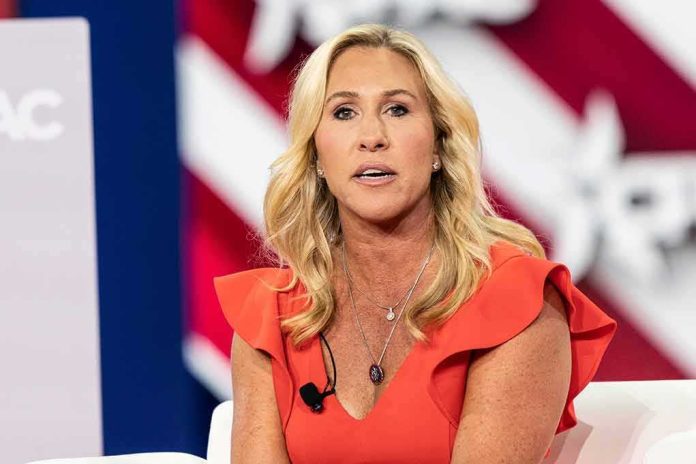
Republicans urging unity around Andrew Cuomo instead of their own nominee have sparked a revolt inside the party, and Marjorie Taylor Greene is making sure everyone hears about it—loudly.
Story Snapshot
- Marjorie Taylor Greene lambasts GOP members supporting Andrew Cuomo over Curtis Sliwa for NYC mayor.
- Party unity fractures as some Republicans back an independent over the official nominee.
- Greene’s criticism highlights ideological divides and questions loyalty within GOP ranks.
- The rift sets up a broader debate on what “unity” truly means for the modern Republican Party.
Greene’s Rebuke: Loyalty or Lunacy?
Marjorie Taylor Greene, known for her unapologetic rhetoric, pulled no punches responding to the peculiar push from some Republicans to rally around Andrew Cuomo, an independent candidate, instead of Curtis Sliwa, the party’s official nominee for New York City mayor. “Are you kidding me?” Greene blasted, framing the suggestion not as a bold strategy but as outright betrayal. Her public rebuke resonates with the party’s conservative base, who see such unity calls as capitulation rather than pragmatism. Greene’s reaction exposes a fundamental tension: is the GOP a big tent, or is it just a tent with holes for anyone to climb through?
Loyalty, in Greene’s view, is non-negotiable. She argues that true party unity means rallying around the chosen nominee, not defecting to a figure like Cuomo, whose political identity and past governorship are deeply at odds with Republican priorities. Greene’s stance is rooted in the belief that compromise on core values erodes the party’s integrity. Her rhetorical question, “Are you kidding me?” isn’t just aimed at politicians; it’s a warning shot for grassroots supporters who might waver in their loyalty.
Why Some Republicans Are Defecting
Supporters of the Cuomo unity push argue that Curtis Sliwa, a radio host and founder of the Guardian Angels, lacks the broad appeal needed to win in a heavily Democratic city. By contrast, Andrew Cuomo, despite his controversies and independent candidacy, has name recognition and a track record in New York politics. Some strategists see this as a rare chance to sway swing voters or peel off moderate Democrats disillusioned by the current trajectory of their party.
But this logic is anathema to party purists. For them, backing Cuomo is like rooting for the other team because your star player is having a bad season. Greene’s critique taps into this sentiment, stoking anxieties about ideological drift and the risk of diluting conservative principles for the sake of expediency. The real issue isn’t just about one mayoral race—it’s about defining the boundaries of party loyalty itself.
The Fractured Notion of GOP “Unity”
The Republican Party has long grappled with the meaning of unity. Should it be a coalition of diverse viewpoints willing to compromise, or a disciplined bloc standing firm on core values? The Cuomo episode puts this question under a harsh spotlight. Greene’s scorn reflects the view that unity built on compromise is a façade. Her critics, meanwhile, argue that pragmatic alliances are necessary to survive in deep-blue political environments like New York City.
Party insiders worry that public infighting, amplified by figures like Greene, risks alienating centrists and independent voters. Yet, for a substantial portion of the base, ideological purity remains the ultimate litmus test. The resulting schism is more than a squabble over personalities—it’s a clash over the soul and strategy of the Republican Party in a polarized era.
What’s Next: Will the GOP Choose Purity or Pragmatism?
The fallout from Greene’s comments will reverberate beyond New York. As the GOP faces high-stakes elections nationally, the debate over unity versus loyalty will intensify. Will the party double down on its traditional values, as Greene demands, or will it adapt to changing political realities by forging unlikely alliances? The answer could determine not just the outcome of one mayoral race, but the trajectory of the party for years to come.
Grassroots activists and party elders alike now find themselves at a crossroads. The choice isn’t just between Sliwa and Cuomo, but between competing visions for the GOP’s future. Greene’s outcry has forced the question: in the battle for party unity, who gets to decide what—and who—the Republican Party stands for?
Sources:
Greene rips GOP’s Cuomo unity push: ‘Are you kidding me?’

